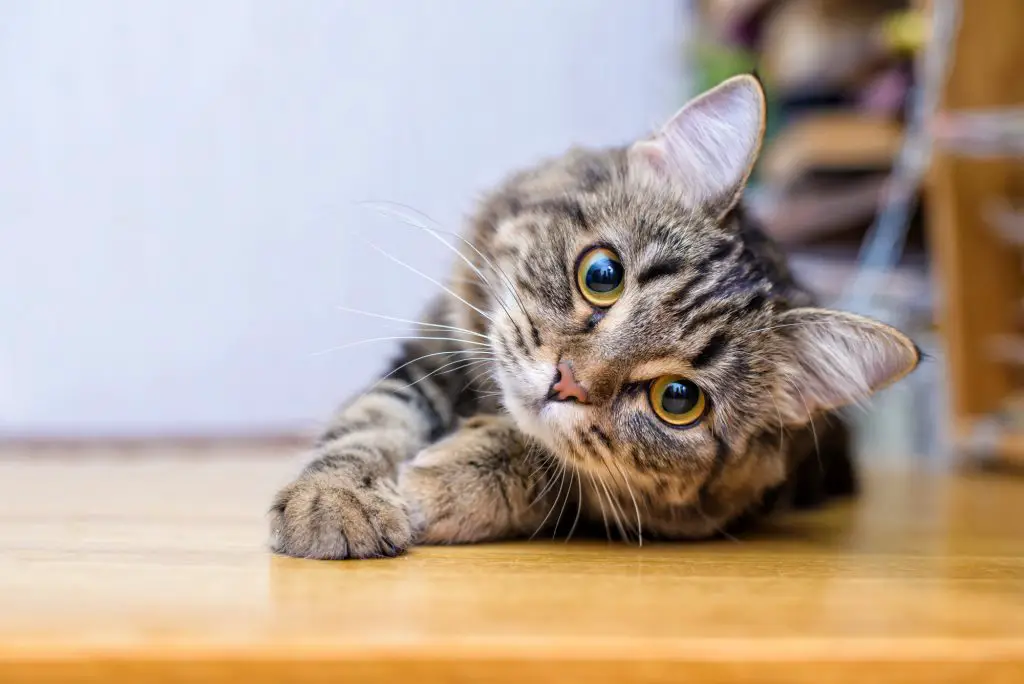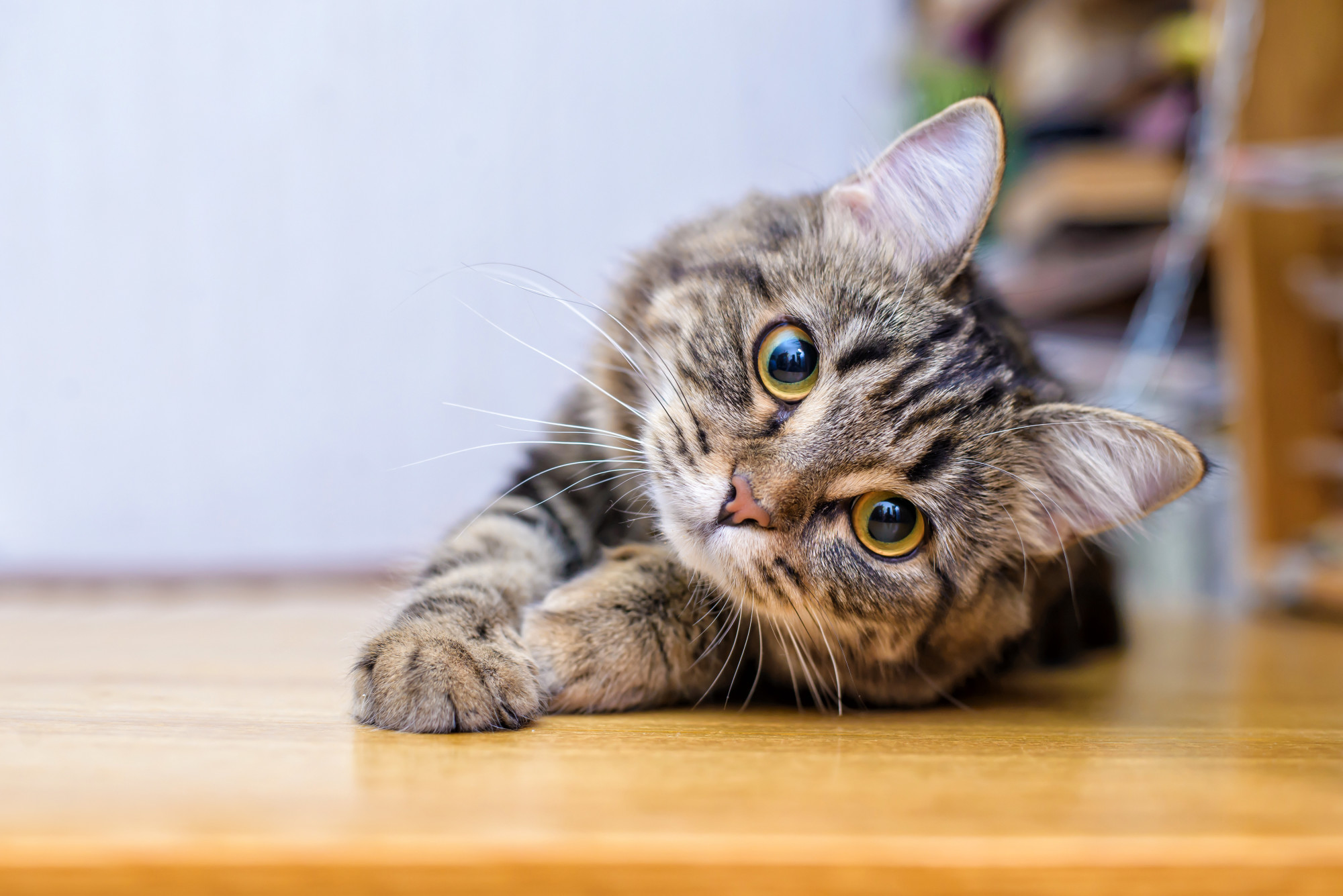Are you wondering: why do cats chew on cardboard? It’s not uncommon for cats to enjoy gnawing on this common household item, but why do they like it so much?
Our experts explain the different reasons why it’s common for cats to chew and eat cardboard in this guide. If your cat is constantly chewing on cardboard, you might be worried about its health.
But don’t worry. As long as your cat isn’t eating too much cardboard, there’s no need to be concerned. It’s one of many normal cat behaviors.

Contents
- 1 Why Do Cats Chew On Cardboard?
- 2 Is Your Cat’s Nutrition Good Enough?
- 3 Does Your Cat Have Dental Issues?
- 4 A Cat Chewing Cardboard Creates Stimulating Sound
- 5 How To Stop A Cat From Chewing On Cardboard
- 6 The Dangers of Cats Eating Cardboard
- 7 Keep Cardboard Away From Cats Who Chew It Too Much
- 8 If A Cat Vomits After Eating Cardboard
- 9 If Your Cat Is Upset, Play or Comfort It
- 10 What Is Cardboard Made From?
- 11 Alternatives to Cardboard For Cats Who Chew
- 12 Did We Answer, Why Do Cats Eat Cardboard?
Why Do Cats Chew On Cardboard?
Different cat owners have different theories about why cats chew on cardboard.
Unlike the topic that male cats start spraying, the fact is, there has not been extensive research done on this topic and any answer given is only speculation.
However, there are a few theories as to why your cat may chew on cardboard that could satisfy your curiosity! Cats have been known to gnaw on everything from plastic bags, shoes, or even electrical cables (by far the worst). So, cardboard is relatively safe.
Is Your Cat’s Nutrition Good Enough?
Cats that are chewing on cardboard, might be seeking out vitamins and minerals. Unfortunately, they won’t be found in cardboard. Are you feeding your cat enough food and is it nutritious and filling?
Cat food should contain all the nutrients your cat needs to be healthy, but if it doesn’t, they may try to find those nutrients elsewhere. This can be dangerous and lead to pets eating very unsuitable things, so if you have a hungry cat be sure to feed it well.
Does Your Cat Have Dental Issues?
Another possibility is that your cat may simply be trying to groom their teeth and gums, as chewing on something hard can help remove plaque. This is especially likely to be true if you don’t brush or clean your cat’s teeth.
The poor kitty could even have a toothache and be trying to correct something that feels wrong inside its mouth.
A lot of cat owners don’t realize they should clean their cat’s teeth.
A Cat Chewing Cardboard Creates Stimulating Sound
Finally, another theory is that the sound of cardboard being chewed provides a sense of stimulation and amusement for cats. We enjoy the sound of eating a crunchy apple or cracker.
They enjoy the sound of scraping their teeth on cardboard. Cats have sensitive ears.
Whatever the reason, it’s important to understand that it is not harmful to your cat to chew on cardboard.
In fact, if your cat is constantly chewing on things around the house. It’s an okay plan to provide them with a designated cardboard scratching post or box, instead of the couch to help curb their impulses.
If you are still concerned about why your cat is chewing on cardboard, please consult with your veterinarian. They may be able to help you determine the cause and provide a solution.
How To Stop A Cat From Chewing On Cardboard
Did you give the cat cardboard in the first place to stop them from tearing up your couch? Well, you might have created a new problem. Now the cat is chewing on the cardboard and maybe refuses to stop making a mess.
There are several things you can do:
- Remove any traces of cardboard from your cat’s environment
- Replace the cardboard with a toy that is specifically designed to be chewed on, like a scratching post for cats
- Put some catnip on the toy to make it more appealing to your cat
- Ensure your cat is well hydrated
- Play with your cat to keep him or her active
- Check her teeth and gums for plaque and problems
If your cat has eaten a lot of cardboard for example while you were away for the whole day, you may be concerned about their health.
The Dangers of Cats Eating Cardboard
There are some dangers when cats eat things they shouldn’t eat. In the case of cardboard, some of those things are more dangerous than others.
Cats who like to chew on cardboard can ingest pieces that can get stuck in the digestive tract and cause a blockage. The first sign of this could be vomiting or constipation, but if left untreated, it can lead to severe pain for your cat or even death. If you think your cat has eaten too much cardboard, take them to the vet immediately.
Keep Cardboard Away From Cats Who Chew It Too Much
If you want to make sure that your cats stay safe and healthy, it’s important not to leave any cardboard lying around the house. Instead of leaving the box out on its own or with a cover over it, put something heavy on top like books or a chair. This way, they won’t be able to get into the cardboard and chew on it.
Another thing that can happen is that cats can eat some of the glue from cardboard boxes if left alone for long periods without supervision. In most cases, this glue isn’t toxic but there are some instances where certain types of glue have been known to cause severe illness.
Some cardboard has been found to contain harmful chemicals.
If your cat has eaten any amount of glue from a cardboard box, take them to the vet immediately so they can remove any ingested material before it causes damage internally.
We recently wrote about how cats might worry about you as much as you worry about them.
If A Cat Vomits After Eating Cardboard
If you’ve got home to find a lot of torn and chewed upon cardboard and some cat vomit, there’s some good news and some bad news. The good news is that your cat is probably just fine.
Cardboard in general isn’t poisonous to cats. The bad news? It means that your cat has a bit of a problem and will need some help breaking the habit.
Cats are designed to vomit up fur balls and things that don’t agree with them. They have very thin intestines that are not developed to process cardboard. That’s why if your cat still seems sick you should take it to the vet.
If it’s left vomit in a few places in your home and seems to be in a good mood, you can be less worried.
That’s typical behavior for furballs and the cat may not even realize it’s done anything dangerous.
If Your Cat Is Upset, Play or Comfort It
Because cats often chew on cardboard for a wide variety of reasons, and one of those is frustration, it could be upset. If your cat is anxious or unhappy exercise might be the key.
If it’s sick or seems agitated get it into a cardboard-free, safe space and provide it with water and regular food. If it becomes less responsive it might be good to take it to the vet for checks.
The amount of cardboard a cat has ingested should be easy to check, but if you’re not sure and a cat has been alone with a box for a long time seek veterinary help.
What Is Cardboard Made From?
The main ingredient in cardboard is cellulose, which is a type of plant fiber. This means that it’s not only digestible but also good for your cat’s teeth. It helps remove plaque and tartar as they chew on it.
Cats have sharp incisors that grow continually throughout their lives, so something like cardboard can help them keep those teeth clean.
There are sometimes solvents used in the manufacturing process of cardboard that can be harmful to cats. Also, remember the previous contents of the cardboard box could pose a health risk too.
Alternatives to Cardboard For Cats Who Chew
If you’re looking for an alternative to cardboard, try providing your cat with some natural fiber mats or bird perches. These can be found at most pet stores and is something that a lot of cats like to chew on.
If you have an older cat who likes cardboard try providing them with some grass or straw to chew on, as these are better for their teeth than plastic toys which can damage them over time.
Cats are habit-forming animals so if they’ve found something that feels good on their teeth, then it’s unlikely you’ll be able to stop them from chewing if it’s available.
Some toys that have been designed specifically for cats can be a good way to distract them from chewing on cardboard. If your cat is not destructive by nature, they might just need something else to chew on instead of the cardboard boxes that are within their reach.
Did We Answer, Why Do Cats Eat Cardboard?
Are you still asking, why do cats chew on cardboard boxes?
If you’re wondering how to stop a cat from chewing on cardboard, it might be good to take them to a professional who can help. This will ensure that no underlying health issues are causing this problem.
Vomiting is normal for cats because they use it to cough up fur balls. However, excessive vomiting or character changes are alarming. If it might be something more serious, take them to the vet for a checkup.
Keep reading Animal Fate for more of our fun articles about our animal friends!



